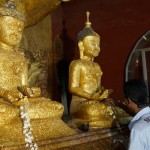Sart Day is the merit-making activities, one of the Thai festival falls on the fifteenth day of the waning moon, or the newmoon of the tenth lunar month (usually sometime in September).
The Thai word Sart comes from the Pali, 'sarada', meaning "autumn season". The word corresponds to the rites of Autumn in other parts of the world. This is specifically referred to the season "when the grain is in the ear", i.e. rice grain panicles droop as seed reaches full size and fills with milky starch in the days before harvest time. Fruits also are in the bud. Therefore, the season of Sart or the autumn is the time at which the crops bear their first yield and a wide assortment of fruits and vegetables are in bountiful supply; the harvest season is starting. People of all races believed that the first harvest of crops and other forms of food, including the first catch of fish or any other animal, should be offered to the holy spirits which, they believed, were the guardians of these life forces. By doing so, they believe that starvation or shortages of food can be prevented, as well as to petition them for prosperity. Somewhat during those years of the ancient time, there were bad harvests or food shortages that the people believed to be caused by the indignation of the holy spirits who might have been angry with human actions. Being fear to the spirits they believed, therefore, the ancient people made offerings and sacrifices to appease the holy spirits. Sart Day in Thailand is when this ritual offering is observed.

The food offered for the Sart rite differs among each part of Thailand. However, the basic ones must be made from rice. The major food is called “Krayasart” prepared from sticky rice, bean, sugar and sesame which is cooked into a paste and then wrapped in a banana leaf. Others are Kao Pong, Kanom La, Kanom Kong, Kanom D-sum, and Kanom Ba. All of them are made from rice, sugar and coconut milk. These foods are prepared with the belief to be in favor of the ancestors and the holy spirits. The Krayasart and other food are brought to the Buddhist temple to be offered to the monks. The rite being complete when libation water is poured as the monks chant the Dedication of the Transference of Merit to benefit all spirits, and the deceased relatives who are still in the realm of the spirits. It is believed that all spirits will have food and water, fulfill their starvation during their transition, and that the merit assists them to move toward favorable rebirth.




